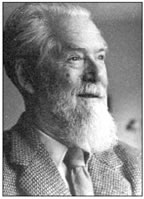John Macmurray facts for kids
Quick facts for kids
John Macmurray
|
|
|---|---|
 |
|
| Born | 16 February 1891 Maxwelltown, Scotland
|
| Died | 21 June 1976 (aged 85) Edinburgh, Scotland
|
John Macmurray (16 February 1891 – 21 June 1976) was an important Scottish philosopher. He looked closely at how people think and act. His ideas were different from many modern thinkers.
Macmurray believed that people are best understood by how they connect with others and what they do. He thought this was more important than just focusing on what individuals think. He made big contributions to how we understand politics, religion, education, and philosophy. After he retired, he became a Quaker.
Contents
Life Story of John Macmurray
John Macmurray was born on 16 February 1891 in Maxwelltown, Scotland. He grew up in a strict Presbyterian family. His father worked for the government's tax department, called the Inland Revenue.
In 1899, his family moved to Aberdeen. John went to Aberdeen Grammar School and then Robert Gordon's College. He later studied at the University of Glasgow. He earned top grades in Classics, which is the study of ancient Greek and Roman culture. In 1913, he won a special scholarship to study at Balliol College, Oxford.
War Service and Important Decisions
When World War I started in 1914, Macmurray joined the Royal Army Medical Corps. In 1915, he was sent to France to help soldiers. In 1916, he became an officer in the Queen's Own Cameron Highlanders. He fought in the famous Battle of the Somme.
In October 1916, he married Elizabeth Hyde Campbell while on a short break from the war. He was badly hurt in battle in March 1918. For his bravery, he was given the Military Cross medal.
While recovering from an injury in 1917, Macmurray gave a sermon in a church. He spoke about the importance of making peace with enemies after the war, instead of seeking revenge. The people in the church did not like his message. This experience made Macmurray believe that many churches were not truly following Christian teachings. Because of this, he decided not to join any church, but he still kept his strong Christian beliefs.
After the War and Academic Career
After the war, Macmurray finished his studies at Oxford in 1919. He also won a special scholarship in philosophy that year. He worked as a teacher of philosophy at the Victoria University of Manchester from 1919 to 1920.
Then, he moved to South Africa for two years. There, he was the head of the Philosophy department at the University of the Witwatersrand. In 1922, he returned to Oxford as a teacher and researcher at Balliol College.
From 1928 to 1944, he was a professor at University College London. He taught about the mind and logic. After that, he moved to the University of Edinburgh. He taught Moral Philosophy there until he retired in 1958.
John and Elizabeth Macmurray did not have any children. After he retired, they moved to a village called Jordans, Buckinghamshire. There, they both joined the Quaker community. In 1970, they returned to Edinburgh, where John Macmurray passed away on 21 June 1976.
Macmurray's Philosophy and Ideas
The main ideas in Macmurray's philosophy are:
- Action is more important than just thinking: He believed that what we do in life is more important than just what we think.
- Humans are connected: He thought that people are naturally connected to each other. We are not meant to be alone.
He talked about these ideas in his famous lectures, The Self as Agent and Persons in Relation. He called his overall philosophy The Form of the Personal. Macmurray summarized his main idea by saying: "All meaningful knowledge is for the sake of action, and all meaningful action for the sake of friendship." This means we learn so we can act, and we act so we can build friendships.
Macmurray did not believe that the mind and body are completely separate. He argued that humans are "personal" beings, not just like machines or plants. He also thought that our emotions are very important for making us act. He looked at how babies and young children naturally want to connect with others.
He also explained the difference between a society and a community. A society is a group of people working together for a specific goal, like a club. A community, however, is a group where people are connected just for the sake of being together and caring for each other.
Macmurray believed he was breaking away from old ways of thinking in philosophy. He was influenced by thinkers like Immanuel Kant and Karl Marx, as well as Christian ideas.
Broadcasting and Other Work
John Macmurray was well-known in Britain before World War II. He gave talks about philosophy on BBC radio. Some of these talks were later published in his first book, Freedom in the Modern World (1932).
He was also a governor at Wennington School, thanks to his friendship with educator Kenneth C. Barnes.
His Influence on Others
Even though his work is not always studied in academic philosophy, Macmurray's ideas have been important in other areas. These include theology (the study of religion) and psychology (the study of the mind).
In recent years, more books and articles have been written about his work. Tony Blair, a former Prime Minister of the UK, wrote a foreword for one of Macmurray's books. Blair said that Macmurray's philosophy was "immensely modern." He added that Macmurray looked at "the critical political question of the twenty-first century: the relationship between individual and society."
Books by John Macmurray
You can read some of his books online:
- Full text at The Internet Archive
- Full text of The Self as Agent at The Gifford Lectures Online [1]
- Full text of Persons in Relation at The Gifford Lectures Online [2]
 | Mary Eliza Mahoney |
 | Susie King Taylor |
 | Ida Gray |
 | Eliza Ann Grier |

